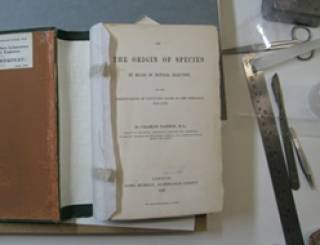Research Support
Lesley Pitman
The year was marked by two significant external drivers: preparation for the forthcoming REF (the Research Excellence Framework); and the publication of the Finch Report on Open Access in the summer of 2012. That meant that developments in Open Access dominated the year, and Library Services was able to build on a very strong foundation in this area. We already had experience in administering Gold Open Access payments, and our repository was one of the largest in the UK. During the year the Library was able to offer advice and support to many academic departments and individual researchers as the Open Access environment changed, and it established itself as the central point for advice within UCL.
Preparations for the REF
Like every other research university this was the year for final preparations for the REF - the assessment process based on the quality of research and scholarship as reported academic journals and similar publications and used to determine the allocation of public funding over the next few years - and colleagues in many parts of Library Services were actively involved in supporting all aspects of this work, from checking the accuracy of publication data and supporting related systems, to providing evidence for the impact of research. The Libraries across UCL were widely recognised in submissions as a fundamental part of the research environment.
New electronic resources
As always, it is the collections that are at the heart of our support for the research process, and Library Services was delighted that UCL provided the second annual tranche of a promised three years of funding for new electronic resources. That enabled us to take out new subscriptions to over seventy new titles and services across all disciplines. To give just one example, UCL's biomedical scientists now have access to Cold Spring Harbor (CSH) Protocols, and Wiley's Current Protocols in Immunology. UCL's digital library is now one of the best in the UK.
The focus of our work over the year was inevitably on the digital, both in terms of the resources we have made available to our users, and those we have created as a part of our digitisation programme or our work in Digital Humanities. Digitisation was a particular area of growth, with funded projects in a number of areas. Generous funding from the Niarchos Foundation allowed us to start digitising some of our rarer Greek holdings. A project to digitise, transcribe and translate the Montefiore Testimonials, in collaboration with the UCL Department of Hebrew and Jewish Studies, was almost completed. The Library continued its productive collaboration with the Bentham Project and the UCL Centre for Digital Humanities, and work to digitise Bentham manuscripts held at UCL and the British Library was funded by the Mellon Foundation.
One of most significant digitisation projects over the year was our contribution to the "Makers of Modern Genetics"
project, funded by the Wellcome Trust. Here Professor Joe Cain, Head of
the UCL Department for Science and Technology Studies, talks about its
significance:
" "UCL Special Collections is making significant progress in its contributions to the 'Makers of Modern Genetics' digitisation project. This work already is paying specific dividends. Colleagues in Science and Technology Studies have been digging into the JBS Haldane collection to study his mathematical population genetics. I myself have been using the Haldane materials to correlate activities with CH Waddington and Hans Grüneberg. I normally have research time only on weekends and late evenings, so digital access vastly increases the speed of some activities."
Professor Joe Cain, Head of the UCL Department for Science and Technology Studies
Katy Makin, the Library's Project Archivist, describes some of the material that has come to light in the course of the project:
"The Wellcome Digital Library project has led to some important discoveries and re-discoveries in the genetics archives held by UCL Special Collections. Examples include the handwritten draft of The Linkage between the Genes for Colour-Blindness and Haemophilia in Man, one of JBS Haldane's most important papers, co-authored in 1937 with fellow UCL academic Julia Bell. Letters from Iris Murdoch, George Orwell and David Attenborough were found in other files in the Haldane papers. Lionel Penrose's WWI diary reveals that he was in Paris on the day of the armistice and records his horrified impression of the debauched celebrations in the city's streets.
From the Galton collection, letters and fingerprints of Alfred Russel Wallace have resurfaced in a letterbook of "eminent Victorians", demonstrating that he was highly regarded by his contemporaries despite his relative obscurity in the 20th century.

Funding for the conservation element of the project has facilitated the repair and restoration of Galton's first edition copy of Darwin's On the Origin of Species, presented to him by the author and annotated by Galton. Four early daguerreotype photographs of ancestors of Karl and Egon Pearson have recently been discovered, at least two of which were made by renowned photographer Antoine Claudet.
The collections also reveal parts of the history of UCL, including a number of letters from Haldane regarding his refusal to evacuate UCL in October 1939, culminating in a short period of residence in the Zoology department. Accounts from the Biometry departmental records include repair bills for bomb damage resulting from V2 hits around UCL, and Karl Pearson's archive includes architectural plans for the original Galton Laboratory."
Katy Makin, Project Archivist, UCL Library Services
 Close
Close

